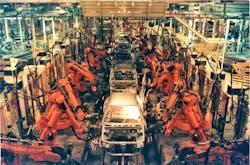Intel has restructured its business to emphasize its ambitions in the growing market for automotive chips. It has also hired an executive from rival chip architect ARM to improve the odds that its chips will power devices like thermostats and factory equipment.
On Tuesday, the company said that it formed a new division called the Automated Driving Group, which will devise technology to let cars sense their surroundings, connect to the internet, and avoid collisions. It will split from another division selling chips for the Internet of Things, which includes devices like connected sensors and industrial robots.
Doug Davis, a senior vice president who has been running the Internet of Things group, will serve as the general manager of the automotive unit. Intel said he postponed his retirement to take the job, which involves carving out part of an automotive chip market worth around $30 billion last year.
Kathy Winter, a former executive at auto component supplier Delphi, will serve as general manager of a division of the group focused on automated driving solutions. She defected to Intel in August after heading Delphi’s automated driving software and services efforts.
Intel’s automotive plans have broadened since its sudden exit from mobile chips last year, which turned its focus to blue-collar computing jobs in factories and car dashboards. In October, it announced a new Atom chip for digital gauges and dashboard displays in cars. It will be available in the first half of 2017, said Ken Caviasca, a vice president of Intel’s Internet of Things unit, in an interview.
Intel has also planned to pour money into autonomous driving technology. Earlier this year, it entered a partnership with machine vision chipmaker Mobileye and BMW to build cars that drive themselves on city streets. In addition, it has pledged to invest $250 million in autonomous car technology over the next two years.
On Monday, Delphi disclosed that it was using an Intel Core i7 chip in an autonomous car system it built with machine vision chipmaker Mobileye. The New York Times first reported the partnership, and that Intel said it would supply a more powerful, unnamed chip in the future.
Virtually all major chipmakers are making similar forays into the auto industry. While Qualcomm recently signed a $47 billion deal to acquire automotive chip giant NXP Semiconductors, Nvidia has taken an early lead in computer chips that handle tricky tasks like machine learning and image recognition.
Intel also announced Tuesday that it hired Tom Lantzch, the former executive vice president of strategy at ARM Holdings, the company whose chip designs beat Intel in the battle for smartphones and other power-sensitive devices. He will officially start in January as the general manager of the IoT unit.
Lantzch is the latest newcomer to break Intel’s executive ranks. Brian Krzanich, Intel’s chief executive, has made a priority of reaching outside Intel’s walls for experience in fields like mobile devices and automobiles, where Intel has pegged future growth. He has increasingly broken with Intel’s tradition of promoting executives after decades of engineering work.
That was clearest late last year when Intel recruited Venkata Renduchintala, a former Qualcomm executive who left to oversee most of Intel’s product development. Intel paid over $8 million in signing bonuses to lure him from Qualcomm, which is itself trying to repurpose chips for devices other than smartphones.
“IoT is nothing short of a revolution,” wrote Renduchintala, also known as Murthy in the industry, in a blog post about the restructuring. “Just as industry and the experiences it creates are evolving, so are we here at Intel.”
About the Author
James Morra
Senior Editor
James Morra is the senior editor for Electronic Design, covering the semiconductor industry and new technology trends, with a focus on power electronics and power management. He also reports on the business behind electrical engineering, including the electronics supply chain. He joined Electronic Design in 2015 and is based in Chicago, Illinois.


